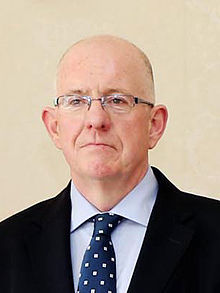Flanagan faces backlash for considering plans to criminalise photography of gardaí on duty

Charlie Flanagan
Justice Minister Charlie Flanagan has faced a backlash after suggesting he would consider proposals to criminalise the photographing of gardaí on duty.
The minister commented on the idea, raised by the Garda Representative Association (GRA), in a radio interview yesterday morning.
Mr Flanagan later added in an official statement that he is “concerned about the public order dimension of gardaí having multiple mobile phones thrust into their faces as they try to go about their policing duties”.
However, a leading civil liberties group has criticised the proposal and Jim O’Callaghan, justice spokesperson for Fianna Fáil, has said it “isn’t necessary”.
Mr O’Callaghan told RTÉ News that threatening or harassing gardaí was already a serious criminal offence, and added: “Policing is done with with the consent and the co-operation of the public. The vast majority of the Irish public support An Garda Síochána and I don’t think we should be putting up obstacles between the public and An Garda Síochána.”
In his statement, Mr Flanagan said: “In my experience press photographers are professional in how they undertake their duties, they do not impede the gardaí going about their work.
“This is regrettably not always the case where public order issues arise. The uploading of images of gardaí undertaking their duties on social media and consequent threats and intimidation is unacceptable to me and that is why I am concerned.”
The Irish Council for Civil Liberties (ICCL) said a blanket ban on photographing gardaí would be “a grossly disproportionate response to the incidents that arise where technology is misused”.
It said widely-circulated images of how gardaí looked and acted at an eviction of housing rights activists from a building at North Frederick Street “demonstrate exactly why the minister is wrong to suggest that this crucial mechanism of transparency should be outlawed”.
Guidance from the Organization for Security and Cooperation in Europe (OSCE) on European Convention rights on freedom of peaceful assembly states that the “photographing or video recording of the policing operation by participants and other third parties should not be prevented, and any requirement to surrender film or digitally recorded images or footage to the law-enforcement agencies should be subject to prior judicial scrutiny”.
The ICCL statement continued: “Time and time again, both in Ireland and abroad, we have witnessed how recordings of police behaviour during protests has helped to shine a light on violations of human rights obligations by police actors, and indeed violations of the law by private individuals where they occur.”






